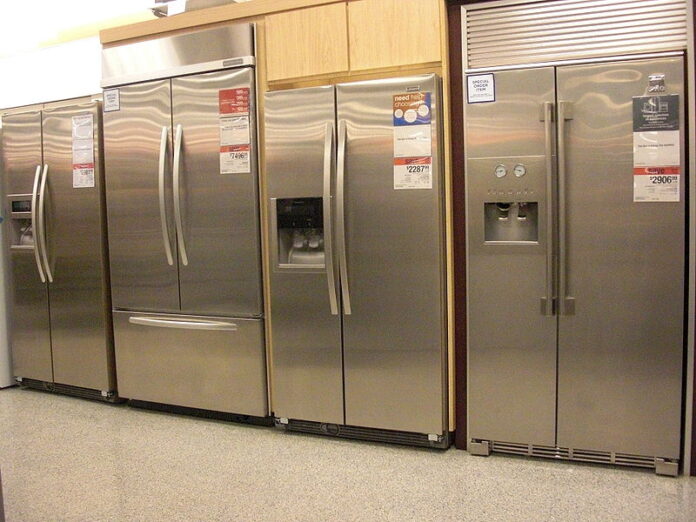By Randy Bracht
(The Center Square) – The Washington Department of Ecology has adopted regulations which will eventually ban in-state sales of air conditioners and commercial refrigeration units containing hydrofluorocarbons – powerful chemical compounds that scientists have linked to global warming.
The agency has also established a new “refrigerant management program” that takes effect Jan. 1 for owners or operators of larger stationary refrigeration and air conditioning systems, such as grocery stores, warehouses, commercial buildings, and apartment complexes with temperature-controlled environments. Along with fees, they must register with Ecology and provide data on leak inspections and other recordkeeping.
For residential consumers purchasing small, self-contained air-conditioning equipment in the future, Ecology estimated costs could increase between $25 and $32. The new rule does not apply to “mobile” air conditioning systems in automobiles, recreational vehicles, planes, trains, or watercraft.
According to Ecology, hydrofluorocarbons, or HFCs, are a group of chemicals used in refrigeration and other applications – including some heat pumps — which can be thousands of times more potent than carbon dioxide in affecting climate change.
“The new refrigerant management program will address the approximately 3.4 million metric tons of carbon dioxide equivalent that leak into the atmosphere every year,” Ecology said in a news release issued in July. “That’s equivalent to what comes out of the tailpipes of about 740,000 cars. While HFCs pose a real risk to the climate, the good news is that safer alternatives are readily available. Many manufacturers have already made the switch.”
In 2020, Washington legislators passed a bill to prohibit certain refrigerants with “global warming potential” and Ecology was directed in 2021 to adopt additional regulations. The move to more “environmentally friendly refrigerants” is part of an effort to reduce Washington’s greenhouse gas emissions by 95% by 2050.
Ecology has enacted a registration and fee schedule for buildings and facilities based on a system’s refrigerant “charge size.” Systems with more than 1,500 pounds of refrigerant are considered large, subject to periodic leak detection requirements and repairs within 45 days, and must pay an initial $150 registration fee beginning Jan. 1 followed by an annual $370 fee.
Refrigerant sellers and reclaimers also need to register at that time but are not subject to any related fees.
Medium systems, between 200 and 1,499 pounds of refrigerant, would pay a $170 annual fee starting in January 2026.
Although allowed by statute, Ecology opted to exempt small systems below 200 pounds from any fees or reporting requirements.
Nor does the rule require replacement of existing equipment containing restricted refrigerants. It also establishes a two-year transition period, to Jan. 1, 2026, to sell off inventories of equipment that will eventually be non-compliant.
Retail food facilities and small businesses citing “economic hardship” as defined by the state’s Regulatory Fairness Act may seek exemptions from leak repairs and certain other requirements.
Program violations can be subject to civil penalties up to $10,000 per day and gross misdemeanor criminal offenses, although non-compliance advisories and warnings are typically issued first.
Based on public comments received on its draft rules, Ecology clarified that only one fee will be assessed on a facility with multiple cooling systems based on its equipment with the largest refrigerant charge size. Among others, that was a concern expressed by the University of Washington, which noted it has three academic campus sites plus healthcare facilities with multiple buildings.
Two manufacturers, Trane Technologies and Honeywell, along with the Washington Food Industry Association and the Association of Washington Business, were among 10 commenters asking for Ecology to delay its rulemaking until the U.S. Environmental Protection Agency finishes a similar process.
Responding in a document called a “concise explanatory statement,” Ecology said it did not expect that Washington’s rule will conflict with EPA’s final regulations. Ecology also noted that state law specifically directs it to adopt rules and regulations to reduce hydrofluorocarbon emissions in Washington and that process will proceed unless the EPA enacts more-stringent requirements which preempt state authority.
‘While EPA’s latest rulemaking closely resembles that of Ecology’s, there are many different requirements within each rule and they don’t really mirror one another,” Ecology communications manager Ty Keltner said Monday in an emailed response to The Center Square.
Two state lawmakers, Republican Sens. Shelly Short and Matt Boehnke, claimed in an Aug. 21 letter to Ecology that the proposed regulations would reduce business production in Washington by $619 million, eliminate 3,000 jobs, and impose costs exceeding $6,000 per employee on small businesses. They cited the state’s Regulatory Fairness Act that directs agencies to reduce costs imposed by such rules on small businesses.
In response, Ecology referenced the variances provided for businesses citing financial hardship, the regulations’ extended phase-in periods, and exemptions for small-system operators as steps to mitigate economic impacts.
The agency established other regulations in 2021 for small cans of refrigerant typically used to recharge A/C units in vehicles, and a ban was imposed on “non-essential” consumer products such as aerosol-propelled noise makers and cleaners used on electronics.
Randy Bracht is a reporter for The Center Square in Washington state. He is the former managing editor of the Grant County Journal newspaper in Ephrata, Washington, where he covered county and municipal government, local schools, and the courts, and an experienced photojournalist, twice winning “Photo of the Year” awards from the Washington Newspaper Publishers Association.
Originally published by The Center Square. Republished with permission.
To read more about air conditioning bans, click here.


























